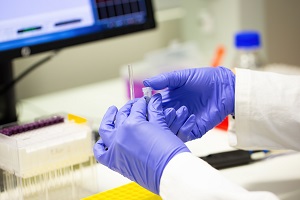Projects in medicine and pharmacy
Learn about and be inspired by previously funded projects. Here are examples of collaborative projects that have been granted funding within the Verification for collaboration, VFS, initiative in 2020 and 2021.

Good quality and local care on Gotland
This pre-study will look at the transition of healthcare towards good quality and local care, and how this can be put into practice. Among other things, the aim is for patients and their loved ones to feel involved in the care, and for the care to be easily accessible and provided with good continuity. This means that healthcare should be perceived as close and having good continuity for the individual. Primary care is the healthcare provider that is judged to have the systemic conditions to be close to people over time and to cooperate with civil society. In order to take on this role as the base of the healthcare system, primary care needs to be strengthened.
The transition requires changes in both culture and working methods, and thus also in governance and management. This pre-study in Gotland aims to provide a collective picture of the current situation, while at the same time identifying possible obstacles at different organisational levels. Ultimately, the collaboration aims to contribute to the transformation and sustainability of the Swedish healthcare system, and to enable primary care to fulfil its important societal mission.
Contact
Good quality and local care on Gotland
Department of Public Health and Caring Sciences in collaboration with Region Gotland.
Responsible academic researcher: Mio Fredriksson

Borgholm model: New successful primary care model is scientifically evaluated
Lack of collaboration between primary care, hospitals and municipal healthcare is a major problem, often resulting in elderly people falling through the cracks and not receiving the interventions they need. It also leads to high financial costs for society due to healthcare interventions being doubled or performed at the wrong care level, such as at emergency departments instead of primary care.
This study will investigate and evaluate the so-called Borgholm model, which has been highlighted at the national level as a good example of a collaborative model to achieve more integrated and person-centred care. The model is based on elderly people with complex care needs being admitted to a virtual “home hospital”, where health and medical care are provided in the home and primary care doctors and nurses serve as the hub of the healthcare interventions.
The model has shown good preliminary results, but has not been scientifically evaluated. The project contributes to a better understanding of whether this type of integrated and person-centred primary care model can lead to fewer urgent care visits and reduced need for specialised care, whether it is cost-effective, and what elderly people and their relatives think about the model.
Contact
Borgholm model: New successful primary care model is scientifically evaluated
Department of Public Health and Caring Sciences in collaboration with Borgholm Healthcare Centre.
Responsible academic researcher: Inna Feldman

Improved sampling of forensic evidence in sexual assault cases
Forensic evidence can be crucial in sexual assault cases, and better sampling methods and tools can provide useful DNA profiles in a larger number of cases. How can older forensic samples contribute to such development? T
he project aims to investigate the effects of long-term storage of DNA from sexual assault cases and to develop a new sampling tool for minimal traces of DNA left through contact, known as touch DNA.
The researchers will work with newly created traces, as well as with older materials and traces up to 40 years old. The opportunity to work with the police on research on samples of different ages and with contact DNA traces opens up entirely new possibilities for researchers to hone methods for both DNA analysis and recovery of large quantities of DNA. This, in turn, will make it possible to solve a larger number of crimes.
Contact
Improved sampling of forensic evidence in sexual assault cases
Department of Immunology, Genetics and Pathology in collaboration with the Swedish Police Authority in Region Stockholm.
Responsible academic researcher: Marie Allen

Greater support for lifelong diet-related health
For individuals with intellectual disability, the risk of overweight and obesity is particularly high during the transition to adulthood and the subsequent shift from paediatric to adult healthcare.
The project will investigate how dietitians in paediatric habilitation and primary care work with diet-related support for children and young people with intellectual disability. Increased knowledge of working methods and support measures for diet-related health will create the conditions for coordinated and improved care interventions and thus lifelong good health.
Contact
Department of Public Health and Caring Sciences in collaboration with the Swedish National Association for People with Intellectual Disability (FUB) and Autism- och Aspergerföreningen Uppsala (AAF Uppsala).
Responsible academic researcher: Päivi Adolfsson.

Development of a new WHO evidence overview report to mitigate the harmful effects of immigration detention in Europe
Research shows that immigration detention (ID) causes or exacerbates negative health outcomes for immigrants. The fact that governments continue to use, and even increase the use of, ID requires an evidence-based guidance promoted by an inter-governmental agency, such as WHO, in a way that is easy for policy makers to implement.
Therefore, the goal with this project is to develop an evidence overview and guidance. Uppsala University is able to lead the development of such a report through the unique expertise that the university possesses. Such a report will highlight the negative health impacts of ID and guidance to mitigate those impacts.
This project also supports the strong interest that WHO and Uppsala University have to develop the University’s Department of Women’s and Children’s Health into a WHO collaborating centre for migration and health.
Contact
Development of a new WHO evidence overview report to mitigate the harmful effects of immigration detention in Europe
The Department of Women’s and Children’s Health in collaboration with The World Health Organization Regional Office for Europe, WHO/Europe.
Responsible academic representative: Soorej Jose Puthoopparambil

Promoting child health in socially deprived communities
The Philani Mentor Mother Model is a South African innovation for improving child health and development. Mothers with experience and good childrearing skills support other mothers in similar environments in creating a sustainable and healthy life situation for themselves, their children and their families. The Philani Model will now be introduced in disadvantaged communities in Malmö through a collaborative project between Professor Mats Målqvist at the Department of Women's and Children's Health and Yalla Trappan, a social enterprise in Malmö.
The collaborative project is based on an earlier project in which Professor Målqvist worked with the Church of Sweden to compile registry data to identify socially deprived communities in Sweden where child health metrics are poorer. Contacts were established with Yalla Trappan and the City of Malmö within the framework of that project. All parties will be involved in adapting, implementing and evaluating the Mentor Mother Model that is the focus of this project. The partners share strong commitment to trialling new methods that can promote integration and better child health among disadvantaged groups in Sweden.
The Philani Model will be an important complement to Yalla Trappan’s ongoing activities and the Preschools Department of the City of Malmö will be able to use the model to reach further into communities with knowledge about early childhood development and, it is hoped, spark greater interest in preschool activities. For the researchers, the project provides an important opportunity to study implementation processes for reducing marginalisation and improving child health.
The project is expected to lead to better conditions for women and children in the deprived communities in which the model is implemented, as well as evidence for the model itself, so that it can be scaled up in the future to cover more communities where there is a need for it.
Contact
Promoting child health in socially deprived communities
Department of Women's and Children's Health
Contact: Mats Målqvist

Feeling confident and taking the initiative in the kitchen
Marie Lange, researcher at the Department of Public Health and Caring Sciences, has entered into a collaboration with FUB (Swedish National Association for People with Intellectual Disability) in Uppsala intended to contribute to greater independence in daily life for adults with intellectual disabilities.
The focus is on food and the meal situation, which is a big part of everyday life for us all, but can be particularly challenging for people with special needs. The project focuses on increasing knowledge of food handling routines.
The goal is to develop material that enables adults with intellectual disabilities to safely handle food products in their day-to-day lives. The material should be easily accessible to many, which means it must meet the means of a very heterogeneous group of individuals. In addition to having a greater voice in their daily lives, increased knowledge about food and food handling can have positive effects on private finances, personal health and the environment.
The project gives involved researchers the opportunity to contribute existing knowledge for practical use while gaining new knowledge that can be disseminated scientifically.
Contact
Feeling confident and taking the initiative in the kitchen
Department of Public Health and Caring Sciences
Contact: Assosiated researcher Marie Lange
